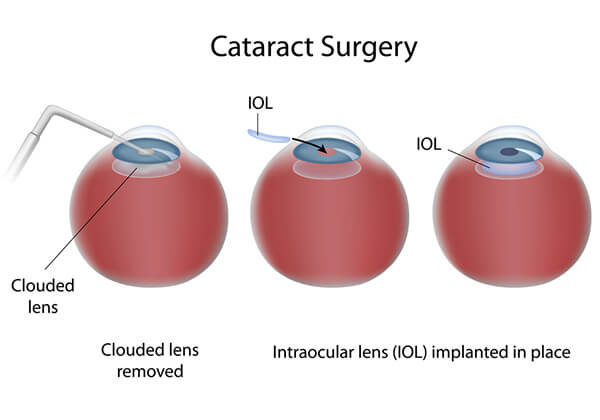What are Cataracts?
Are you in the greater Cleveland, Ohio area and want to learn more about cataracts and cataract treatment options? A cataract is an opacification (clouding) of the natural lens inside of the eye. The lens helps us focus on objects at different distances. As a part of the normal aging process, changes in the lens can cause it to become cloudy. Left untreated, a cataract can become so dense that it causes blindness. In fact, cataracts are the leading cause of blindness in the world. The original meaning of “cataract” is “waterfall,” and the name was chosen because distorted vision caused by a cataract reminded people of the distorted view that is obtained when looking through a waterfall. If you’re concerned about your symptoms of Cataracts or want to speak with our eye doctors directly, schedule an appointment at the Cleveland Eye Clinic.
Who gets Cataracts?
Most people who develop cataracts are older than 60 years. Cataracts in older people are so common they can be regarded as a normal part of the aging process. Among the major conditions related to cataracts are diabetes or injury to the eye. Medications such as steroids can also cause cataract formation.
In rare cases, congenital cataracts are present at birth. These cataracts are usually related to the mother having German measles, chickenpox, or other infectious diseases during pregnancy or to the child having certain syndromes (e.g. Marfan’s). Some cataracts are inherited.

What are the symptoms of Cataracts?
Typical symptoms include:
- Cloudy, fuzzy, foggy, or filmy vision.
- Changes in the perception of colors.
- Problems driving at night because headlights seem too bright.
- Problems with glare from lamps or the sun.
- Frequent changes in your eyeglass prescription.
- Double vision.
How do I decide to have Cataract surgery?
Most people have plenty of time to decide about cataract surgery. Your doctor cannot make the decision for you, but talking with your doctor can help you decide.
Tell your doctor how your cataract affects your vision and your life. Read the statements below, see which ones apply to you, and tell your doctor if:
- I need to drive, but there is too much glare from the sun or headlights. I do not see well enough to do my best at work.
- I do not see well enough to do the things I need to do at home.
- I do not see well enough to do things I like to do (for example, read, watch TV, sew, hike, play cards, and go out with friends).
- I am afraid I will bump into something or fall.
- Because of my cataract, I am not as independent as I would like to be.
- I cannot see well enough with my glasses.
- My eyesight bothers me a lot.
You may also have other specific problems you want to discuss with your eye doctor. Our doctors will give you cataract surgery options.
How can Cataracts be treated?

The natural lens of the eye that has been damaged by a cataract is surgically removed and then replaced with a clear artificial lens. During cataract surgery, usually done on an outpatient basis, a tiny incision is made in the eye and the cataract-damaged natural lens is removed through the incision. An artificial lens is then inserted through the same incision. Most patients have significantly improved vision after cataract surgery procedures.
Can a Cataract return?
A cataract cannot return because the entire lens has been removed. However, in as many as half of all people who have extracapsular surgery or phacoemulsification, the lens capsule (the tissue bag that supports the replacement lens) becomes cloudy. This cloudiness can develop months or years after surgery. It can cause the same vision problems as the original cataract.
The treatment for this condition is a procedure called a YAG laser capsulotomy, which is named for the material used to generate the laser energy (yttrium-aluminum-garnet). The doctor uses a laser (light) beam to make a small opening in the capsule through which light can pass unimpeded. This surgery is painless and does not require a hospital stay. Most people see well after a YAG capsulotomy. Your doctor will discuss the risks with you.
What are the benefits of Cataract surgery?
Cataract surgery restores quality vision for millions of patients each year. Good vision is vital to an enjoyable lifestyle. Numerous research studies show that cataract surgery restores quality-of-life functions including reading, working, moving around, hobbies, safety, self-confidence, independence, daytime and nighttime driving, community and social activities, mental health, and overall life satisfaction.
What are the risks of Cataract surgery?
Cataract surgery is performed millions of times every year in the United States. In fact, it is the most commonly performed surgery in the U.S. About 98 percent of patients have a complication-free experience that results in improved vision. Nevertheless, cataract surgery has risks and complications. Most complications resolve in a matter of days to months. In rare cases, patients lose some degree of vision permanently as a result of the surgery.
Is it still necessary to wear thick glasses after Cataract surgery?
No. Today, cataract patients who have artificial or intraocular lenses (IOLs) implanted during surgery may only need reading glasses for close vision. Patients who do not receive IOLs wear contact lenses for distance vision and reading glasses for close vision. Some patients choose to wear multifocal contact lenses for all distances.
How successful is Cataract surgery?
Cataract surgery has an overall success rate of 98 percent. Continuous innovations in techniques and instruments allow our Cleveland, Ohio cataract surgeons to treat more patients while keeping costs down and improving the quality of patient care.
Are lasers used to treat cataracts?
In general, no. In some cases, the bag-like capsule membrane that supports the artificial lens that replaces the damaged cataractous natural lens may become clouded several months after cataract surgery. In that case, a YAG laser may be used to make a clear opening in the lens-containing membrane.
What kind of doctor performs Cataract surgery?
The cataract specialists at the Cleveland Eye Clinic in Ohio are medical doctors, MDs, who, after completing medical school and an internship, have had 3 or more years of special training in eye diseases and surgery, are called “ophthalmologists.” Only ophthalmologists who have had special training in eye surgery are allowed to perform cataract surgery.
The Ohio Cataract Surgeons at the Cleveland Eye Clinic want to help you achieve your best vision possible. Take our online cataract self-test, and start on your journey to better vision.








